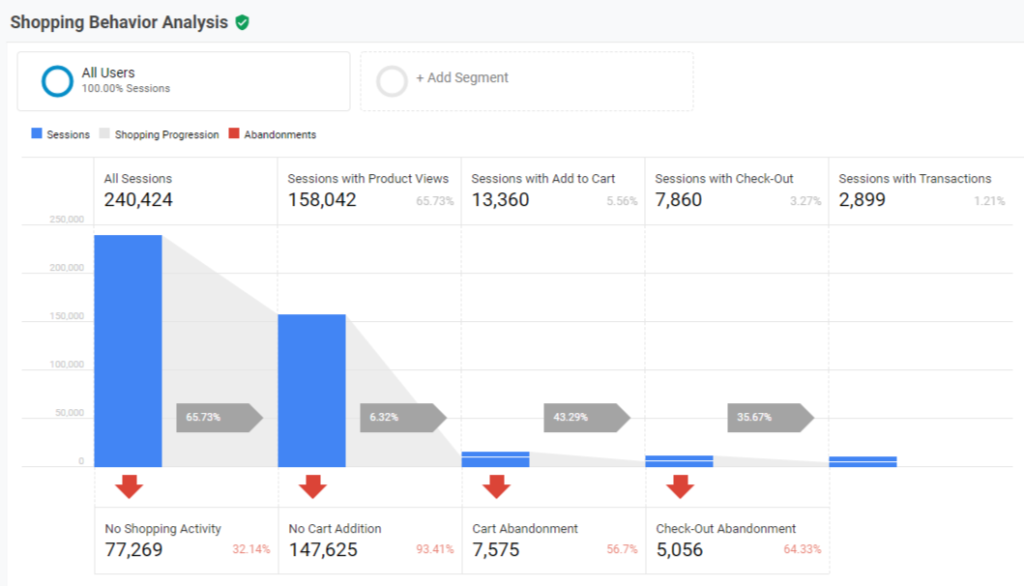During an SEO audit, any tool you use to measure organic success should be included. So if you’re using Google Analytics, your implementation should be reviewed by the audit team.
Google Analytics is ubiquitous these days, running on almost every commercial website out there. In many instances, however, companies aren’t getting as much out of the data as they could be. This can in part be caused by an incorrect or “unfinished” implementation.
Accurate measurement of website traffic and consumer behavior is as important as simply tracking rankings when it comes to SEO. An agency shouldn’t just be looking to grow your traffic- they should be looking to grow your revenue.
So what should the SEO audit look for in your Google Analytics? Let’s take a look at most important components below.

Enhanced E-commerce
You want visitors to turn into customers. Enhanced E-commerce tracking helps explain why, or why not, people are buying from you.
While most of this is easy to set up, the steps to implementing enhanced E-commerce tracking differs based on the E-Commerce platform you’re using. Leading platforms like Shopify, BigCommerce & Magento expose the data layers necessary to track the data needed for enhanced E-commerce tracking in Google Analytics. In some cases, 3rd parties have developed a data layer plugin so you don’t have to do any manual javascript or .php coding.
If you have to implement the data layer manually, some metrics such as Product List Performance (which can help you with visual merchandising), often takes the most effort and scripting expertise.
A great audit will identify any issues with your implementation, and show you how to fix it.
Goal Tracking
Many times, new visitors to your site, whether it be from organic or paid media, aren’t ready to buy just yet. Non-transactional goals should be set up in GA to track such things as:
- Newsletter Signups
- Deep Visits/Dwell Time
- Interaction with Product Reviews
- Telephone Calls
- Video views

On-site Search
We spend a lot of time researching what people search for on Google. Perhaps just as important is the search box in your E-commerce store. Properly implemented, the Site Search report in GA is a goldmine of data that can be used across your organization, and by your agency.
Some of the uses include:
- Info for your buying & merchandising team on product you don’t have, but people want
- Visual merchandising based on search numbers
- Populating products in your social and emails
- Potential pricing issues if there are many searches and few sales
- Content for how to & other customer service/educational web pages
Multi-Channel Funnels
One of the big concerns we hear, aside from not getting enough “free” traffic, is that the organic channel doesn’t convert as well as paid search. There’s a few valid reasons for this, since a lot of organic search is investigational as opposed to transactional.
However, an audit should include a look at the lifetime value of organic customers. Since most of the reports people look at are “last non-direct click”, revenue from customers that first found you through organic won’t be included.
An audit can’t “fix” that problem, but it should describe what your actual organic ROI is in order to level set expectations going forward.
Why is this Important in an SEO Audit?
To be sure, analytics and SEO are two different things. It may even be unusual for an SEO agency you engage with to do this portion of the audit.
We think it’s important.
The third step in our E-commerce SEO Audit Roadmap™ is “Set Goals”. To do that, the measurement environment must be in place and working like it should.
Goals for an organic search campaign will vary from company to company, but they should definitely include more than just revenue.
Ready to get ranked? We’re ready to help.





